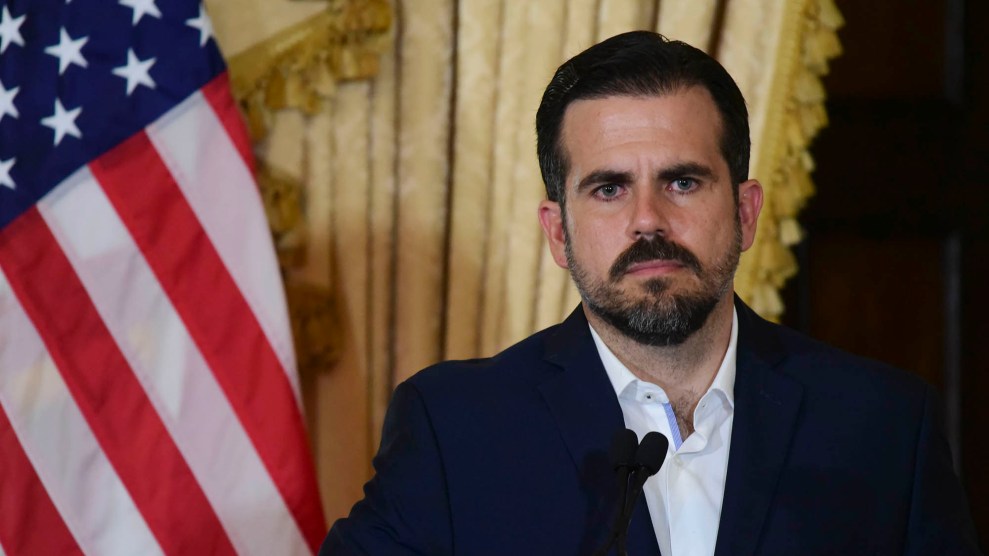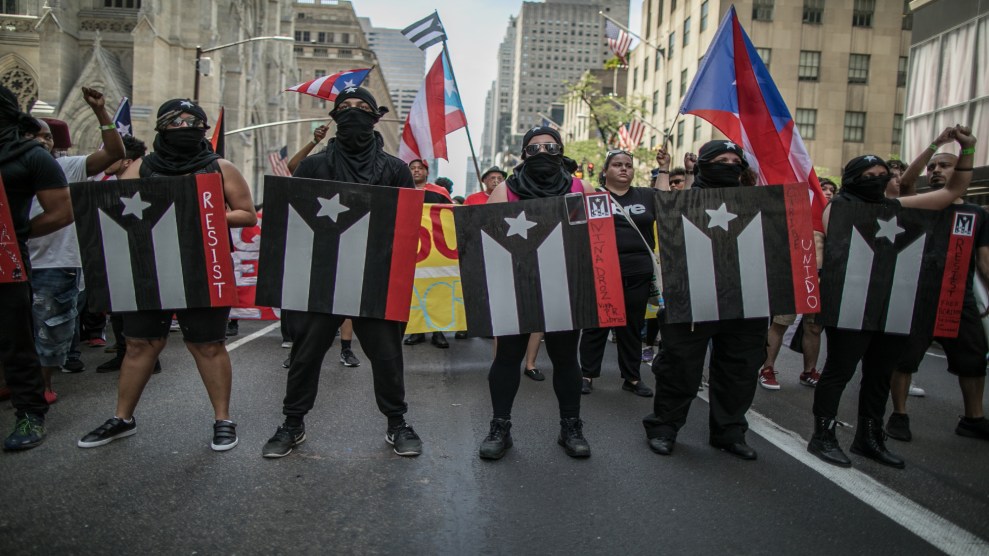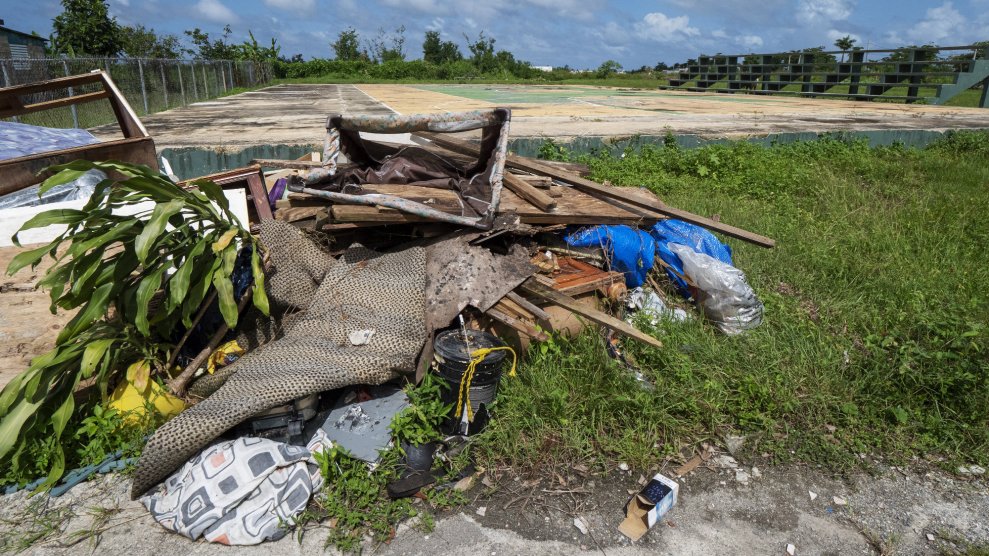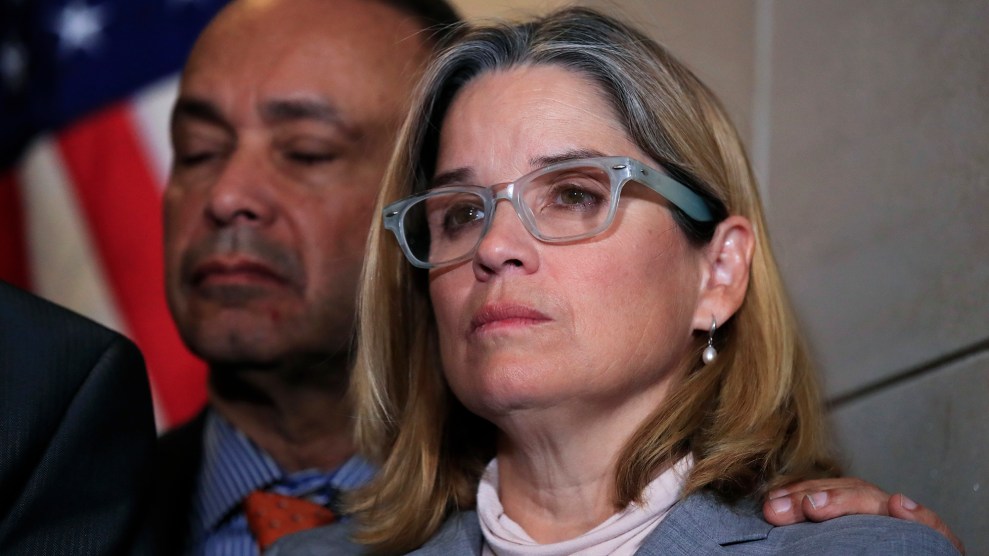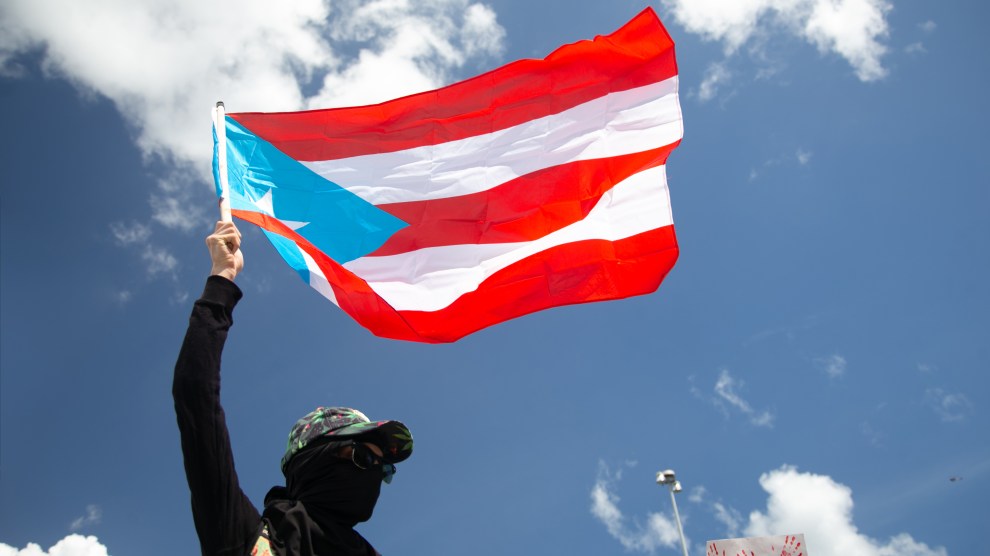
22 July 2019, Puerto Rico, San Juan: A masked demonstrator waving a Puerto Rican flag in protest against Governor Rossello.Marcos Caballero/DPA via ZUMA Press
Next week marks the two-year anniversary of Hurricane Maria ripping Puerto Rico apart, killing an estimated 3,000 people and wracking nearly $100 billion in damages on an island already suffering a deep financial crisis. Since the storm passed, the island has seen hundreds of schools close, more than one government official indicted and arrested on charges of corruption, and the unprecedented resignation of governor Ricardo Rosselló after a news organization published 889 pages of texts among the governor and his associates including jokes about hurricane victims, misogynistic and homophobic comments, and documenting efforts to target opponents with disinformation.
Rosselló’s resignation and the massive protests surrounding it brought the bright spotlight of international media for a few weeks, before attention inevitably turned away. It was a familiar dynamic to freelance journalist and educator Ed Morales, who, in his new book Fantasy Island: Colonialism, Exploitation, and the Betrayal of Puerto Rico, explains how the island’s colonial status and the ways its economy was set up as a captive market for US corporations led to its modern day debt crisis and the neoliberal austerity measures that have followed.
Morales, the son of Puerto Ricans who moved to New York, has been writing about the island since the 1980s. Today he publishes primarily at The Nation. He recently spoke with Mother Jones about his new book, saying he wrote it, in part, to help mainstream audiences learn what America’s ongoing colonialism means for his homeland.
Why is this book timely now, as we come up on the two-year anniversary of Hurricane Maria?
Too much of the media picture—whether it’s mainstream or even beyond the mainstream—focuses on the last five years or so and the onset of the debt crisis in their analysis of Puerto Rico. A lot of problems we have in interpreting current events suffer from a lack of historical context. One of the early revelations I had was looking at the book by Kim Phillips-Fein about the New York City debt crisis that I lived through as an adolescent, and seeing so many parallels to the criticism of the local government here, for running up the debt that they did, and seeing how what they were trying to do is protect a working class in New York, by giving them educational institutions and parks, which is what the American Dream is supposed to be about, at least in an urban context. Policy came out of this desire to maintain and nourish a working in a middle class, both in the United States and in Puerto Rico, that brought the analysis of the trajectory of both countries histories together.
The way that the media often portrays Puerto Rico is this strange place that’s somehow attached to the US—and we don’t really quite know how that happened, or how it got into trouble—when all along it’s been very intimately related. My whole life I’ve also been sort of obsessed with how Puerto Rico has had a kind of a media blackout. I’ve been reporting about Puerto Rico since the late 80s and found an incredible indifference from editors, or lack of knowledge. Really, it’s only been in the last few years that interest has increased, and then the early reporting about the debt crisis was entirely in the financial trade publications and had a really narrow point of view about what was going on. It was just based on the interest of US investors.
How has the framing of the Puerto Rico story by mainland journalists affected the lives of Puerto Ricans?
The lack of any narrative about how it got into its debt crisis contributed a lot to the inaction of the Democrats and the Obama administration and what the implications of the undemocratic fiscal oversight and management board would be for a society that thought of itself as a functioning democracy.
The narrative was that the Democrats don’t want to be perceived as giving Puerto Rico a bailout. And that that was the main political motivation for not looking into different ways of approaching the debt crisis. Bernie Sanders suggested buying up some of the debt, negotiating themselves with Wall Street giving Puerto Rico new debts on better terms—none of that. There was no pressure on Obama or the Democrats to maybe come up with alternative solutions to creating the fiscal oversight and management board.
Even then the narrative, as I described in the book, was that this was supposedly an act of compassion. Technically, it did have the effect of freezing payments for a period of time and avoiding the numerous lawsuits that didn’t have to be faced separately. But we’re seeing it already. This deal will require Puerto Ricans to be paying that debt off for 40 years at the expense of what could be considered essential services.
Who is this book for?
I wrote it for Puerto Ricans in the mainland, and for Puerto Ricans in general to try to give a long arc, a narrative context, for what the island has gone through. I don’t want to sound like I’m going to be educating people in Puerto Rico because, of course, that’s always interpreted in a negative way, as someone who doesn’t live there, someone from the diaspora. I try to be as compassionate as possible indoctrinating myself and becoming a Puerto Rican, which I am anyway, but most Nuyoricans don’t know don’t know a lot of things about Puerto Rico: who is the mayor of San Juan, who’s in the Senate, who’s popular, or what the slang is. In a lot of ways, I think Puerto Rico’s own media has not given them enough information, with the exception of the Center for Investigative Journalism, which has opened up a lot of inquiries that now the different parts of the media are really digging into.
I also wrote it for Americans in general to to try to help them understand something that they have been given very little information about, that the US holds a colony and has held one for over 100 years. The policies that are being enacted in Puerto Rico could be a dry run for states that are in fiscal trouble right now, something that should set off alarm bells for mainstream Americans. This way of dealing with municipal debt, which, unless you follow the financial press, is really one of the under-publicized, major issues about the economy. And we saw how it all blew up.

Every time something about what’s happening in Puerto Rico makes it into the mainstream consciousness there are inevitably comments from people who don’t live there that reflect total ignorance. Do you see that too?
Yeah, the US treats these places as extra-constitutional places where they don’t necessarily have to apply the Constitution. Not all of the people who live in these places are US citizens, but many of them are US citizens who really don’t have the full protection of the Constitution. It’s sort of an experimental population, where the US can arbitrarily pose things where actually US citizens are not protected. So that’s very disruptive of the American exceptionalist myth that most people in the US believe. These are examples of places where democracy is distorted. And the people who are doing the distorting is Congress as an extension of the American people.
Your book comes on the heels of the historic resignation of former Gov. Ricardo Rosselló, and the indictment of two of his senior officials. How does that fit into the story you’re telling in the book, that leaves off just before that happened?
It’s evidence of how the people in leadership in Puerto Rico lack a true sovereign status or a true democracy, and operate within an economy that doesn’t support local business people or local initiatives to take off enough to be self-sustaining. It was designed to be a captive market for US products and US corporations to get profits and not reinvest them in the island.
When you have that kind of situation, and no voting representation in Congress and cannot vote for president, it leads to a dysfunction where the politicians come to understand that the only source of power is lobbying and favoritism, and not a healthy economy that could produce a tax base that could allow the government to not only have to employ a large part of the population. It leads to the conditions for widespread corruption and favoritism. That’s what you see with the Rosselló government.
Most previous governments have had some taint of corruption associated with them, some worse than others. As I described in the book, with the imposition of the fiscal oversight management board, the governor was really reduced to this charade. The Fortuño government, which was the other pro-statehood government that preceded Rosselló, had already begun this process of implementing austerity. Rosselló’s party didn’t necessarily oppose austerity measures. And they did not oppose the Junta, but their only source of political existence was to appear to be opposing the board—which philosophically they probably didn’t, but that was the only way of getting political power.
What was a surprise to me was the depth of their sexism and homophobia and willingness to just put that on Telegram, but it wasn’t surprising to me that they basically thought that most of what they were doing was kind of a joke. They were just trying to control public relations and make sure that the patronage was going their way, reinforcing their political power.
Defenders of President Trump used the Rosselló resignation as evidence that the president was right in his relentless attacks on the island’s government as corrupt, and therefore that somehow justified the president’s treatment of the island. But your book points out how local corruption is built in to the relationship between the US and Puerto Rico. Can you elaborate?
I don’t want to paint everyone with the same brush. There are elected officials in Puerto Rico who are really trying to serve the people or affect change—the only thing I would quibble with is that maybe they do it in a way that they’re not seeing as just rehashing systems that are not getting Puerto Rico anywhere. But I don’t think that it’s fair to characterize all of the elected officials in Puerto Rico as being innately, essentially corrupt. But at the top, the ruling mechanism seems strongly tainted by corruption.
The origins of most of the investigations were from the FBI and federal investigators. I think it’s possible that there are times that federal investigations in Puerto Rico could be ramped up for one political purpose or another. I do think that these things came out very quickly and very conveniently for the Trump narrative. It’s really unfortunate that Puerto Rico has lost a lot of political points, because Trump was in effect proven to be correct.
Trump may be a convenient foil for his political opponents looking to attack him by using his treatment of Puerto Rico, but isn’t it true that American leaders of both major parties have treated the island and its people in similar ways?
One of the things that I tried to do in one section of the book about the imposition of PROMESA [the 2016 Puerto Rico Oversight, Management, and Economic Stability Act] is talk about how a lot of Democratic senators voted to shut down the discussions about different ways that the law could be written. It was pretty extraordinary that there was a bipartisan bill like that that passed at a time when almost nothing significant was being passed in the US Congress. So a lot of Democratic senators, like Charles Schumer, could be seen as people who really just felt like there was no reason to try to find different ways of resolving the problem without implementing this fiscal oversight management board.
The difference with Trump is that he’s overt in his name calling and racist criticisms, and but that’s part of his whole political schtick. So that enrages people yes, but it distracts from the general lack of concern that the US Congress has about Puerto Rico. The US Congress is really in charge of Puerto Rico, not the president. It’s really sad: when I’m back in Puerto Rico, you see these headlines in El Nuevo Dia talking about ‘Puerto Rico asuntos (affairs) are going to come up today in the House Committee,’ and there’s absolutely no reporting on it in Washington and very little comes out of it. Really, it’s sad, because people there do open their eyes when they hear about any little thing that is going to happen in the House Resources Committee and they don’t really have any idea of how completely insignificant it is in American political discourse.
You spend a lot of time in the book walking readers through the evolution of political parties on the island, and how they formed largely around the approach to addressing Puerto Rico’s status with the US. How has the debt crisis and Hurricane Maria changed that?
Both PROMESA and the hurricane together have created a possibility of a shift in Puerto Rican politics, because the first thing that happened with PROMESA is because of those Supreme Court cases, that said, pretty much in black and white that Puerto Rico does not have a special semi-autonomous relationship with the United States, which is something that the Commonwealth party had really based itself on since the inception of the the constitutional era, the Commonwealth era. It really took a lot of steam out of the Commonwealth party as a viable political party. Then the #RickyRenuncia part of it has also shed a negative light on the statehood party. Statehood was already kind of a pipe dream, because Republicans in Congress had never supported it and Republicans are still controlling the Senate.
A lot of the rhetoric during the #RickyRenuncia protests was that both of the parties were becoming rapidly becoming obsolete. The elections in 2016 came a few months after Congress voted in PROMESA and everybody knew there would be an oversight board, and you had a number of independent candidates that garnered close to 20% of the vote. So already you had this viable idea of third party candidates that were not from the Independence Party, and I think that that really continues now.
I’ve written a little bit about the Victoria Ciudadana (Citizens Victory), which I think is a really important movement. We have to see whether they call for some kind of constitutional assembly to present new status options that could be brought directly to Congress and not through the traditional parties, or propose viable political stances that voters might prefer over the statehood or the commonwealth party. The commonwealth party is really in crisis. So there’s a lot of flux. In the 2020 elections, maybe it’ll be Carmen Yulín herself, who will move the party in a different direction. Or it could be one of these alternative candidates coming out of this movement from Victoria Ciudadana.
Your deep dive into the dynamic and evolving political context on the island makes me think about the perhaps well-meaning refrain from the political left on the mainland that suggests that statehood is the only option going forward. Some say that’s just another example of colonizers dictating next steps to the colonized. How do you see it?
I’m sure a lot of that is as well meaning because when you take the whole colonialism thing out of the equation it seems like “Oh, well, this is a great thing to do, because it is Puerto Ricans’ full constitutional rights and representation and full entitlement, and they can no longer be discriminated against in the way that they have been.” But they don’t take into account that there’s a very strong national culture in Puerto Rico. And there are many Puerto Ricans who don’t necessarily want to become part of the United States for cultural reasons, or other people who just actually feel naturally that they don’t want to be associated with a country that has colonized them for 120 years. So that’s all in play.
I do write about a little bit about the radical statehood proposal 20 years ago—which was really kind of interesting, and perhaps too idealistic—which proposed that progressive Puerto Ricans take control of the statehood movement from the sort of Republican-esque or regressive elements that currently run it. Their argument was that since globalization has made nationalism less important, and an independent Puerto Rico would have a difficult time surviving the cut-throat, global capitalist world, that maybe the best thing would be to assert Puerto Rico’s rights as a multicultural Spanish speaking state and become part of this vanguard of recognizing multiculturalism and bilingualism in the United States, and make alliances with all of the forward-thinking people who are concentrated in the cities who believe in multiculturalism and bilingualism and become part of an avant garde that would lead the United States into a more progressive future. But that was really strongly criticized because of this really strong nationalist feeling.
So one thing that was really positive about #RickyRenuncia thing, which I wrote about in The Nation, was that I think it represents this new kind of intersectional nationalism that I think the radical statehood movement was envisioning, but not wanting to be a state, wanting to critique the problems with Puerto Rican nationalism, which in the past have been a lot of patriarchal attitudes and homophobia, and lack of intersection with global interests. So this kind of new nationalism has come about which I find very exciting and interesting, and really could be something that I think progressive movements in the United States and other parts of the world could look at as a kind of, if not a model, at least an inspiration.

